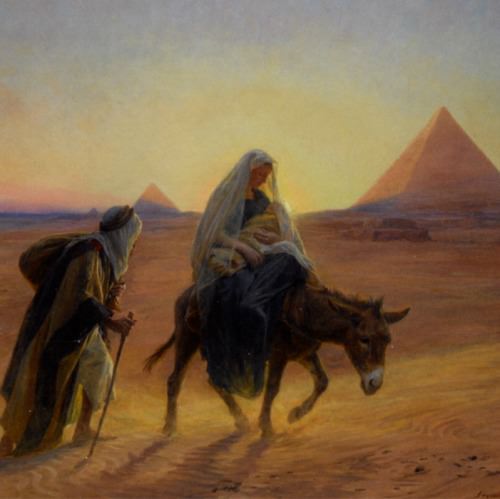 Many children associate Christmas with journeys made and odd places visited. Plane and train trips to visit separated parents, car trips to visit rarely seen relatives, camping expeditions to tent cities by the beach.
Many children associate Christmas with journeys made and odd places visited. Plane and train trips to visit separated parents, car trips to visit rarely seen relatives, camping expeditions to tent cities by the beach.
Journeys and odd places are also the stuff of the first Christmas stories: where Joseph, Mary and Jesus make roundabout journeys to be in strange places that turn out to be God's right places. In Luke's Gospel the pregnant Mary makes a long and tiring journey from Nazareth, a nothing village, to visit her cousin in the hill country, and returns in time to go to Bethlehem, a faded town once important because it was once the city of King David. The trip was at the demand of the taxman. It also associated Jesus with David, the archetypal King.
When they get to Bethlehem they cannot find room in the inn, so they go to a field where Jesus can be born and by visited by shepherds, another image of royalty.
In Matthew's Gospel, Jesus is born in Bethlehem, but has to flee to the unfashionable Egypt to escape Herod's dragnet for infants of his age. The result is that Jesus, like Joseph the patriarch, is called back out of Egypt.
Through arduous journeys to odd places forced on him by the contingencies of his life Jesus is linked to key figures in God's relationship to Israel and to Jewish hopes. The first Christmas stories are about a family under duress taken on long journeys to places that would never have been in their plans. They are also about the devisings of a scholarly God who ensures that they make the journeys and find themselves in the places that correspond to key texts in the Scriptures.
In Jesus' case, of course, his final journey to the wrong place took him finally to Jerusalem where he was taken, tried and killed. Like a Christmas trip to Syria today, that was the journey that everyone warned him against. It was also the place where through his constancy in love God brought life out of death.
The story of Christmas suggests that we are never in control of our journeys or our destinations. To plan prudently in our financial affair, our career path and our mission is important because it accepts responsibility for the steps of our journey. But planning never comes with guarantees of results.. A fall and a plaster cast can cripple the best-planned hiking trip; a financial crisis can knock the stuffing out of the best constructed retirement plan. They can take us to places where we would rather not go.
But the assertion of our lack of control over our journeys and the place they will take us is only the lesser half of the Christmas message. Christmas also reminds us that the disruption of our journeys and the forced visitation of odd places is never lost time. In those journeys and places we may later recognise God's hand. The risk, the loss, the flight and the anxiety may later seem to be gift-bearing, and what at the time appeared to be a circuitous detour is later seen to be a straight path through terrain we needed to traverse.
That may also be true of the larger journey of humanity. Over the last year the world has seemed to many of us to turn back to dark places. It has become more conflicted, more inhospitable, less open to connection, more making of fences, more brutal in its treatment of difference, less open to the future. It is like the world in which Herod felt at home, filled with dynastic intrigue, murderous use of power and a trip to work past the corpses of executed patriots and brigands hung up to dry.
And yet goodness and freedom broke through in Herod's time. If Christmas is a living story for us we may hope that in these public indecencies today goodness, love and courage will be stronger than all the things that make for death and despair.
Andrew Hamilton is a consulting editor at Jesuit Communications.